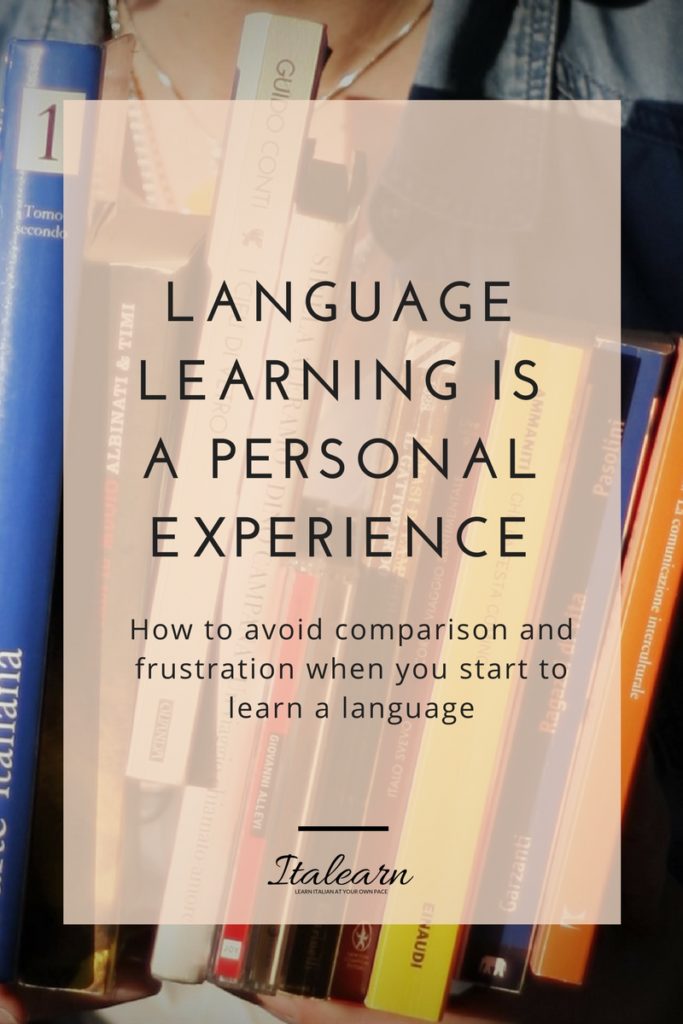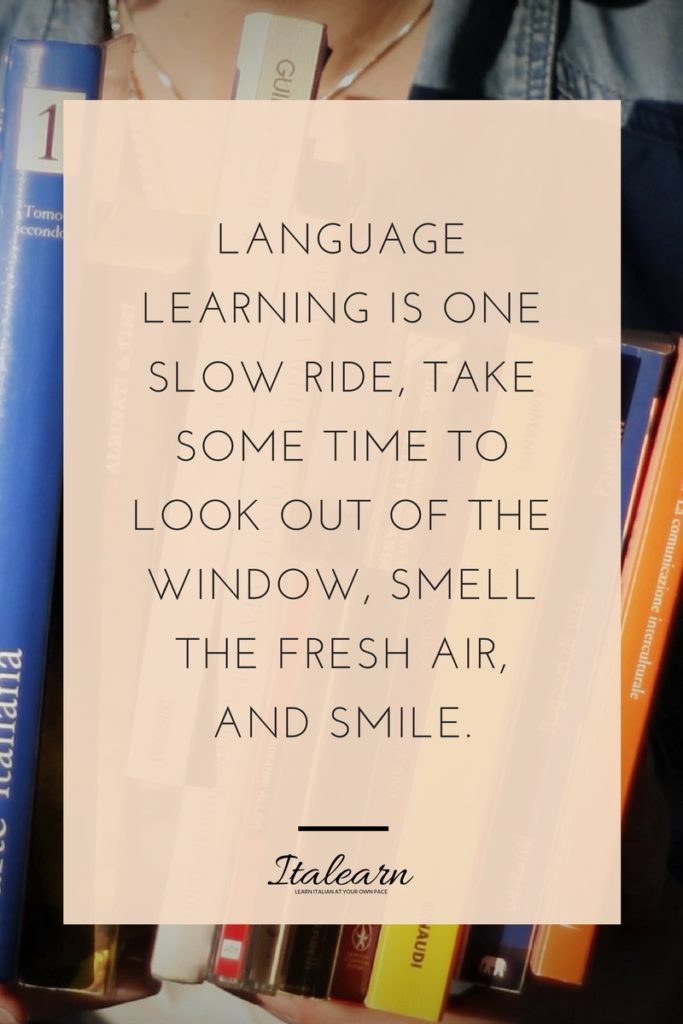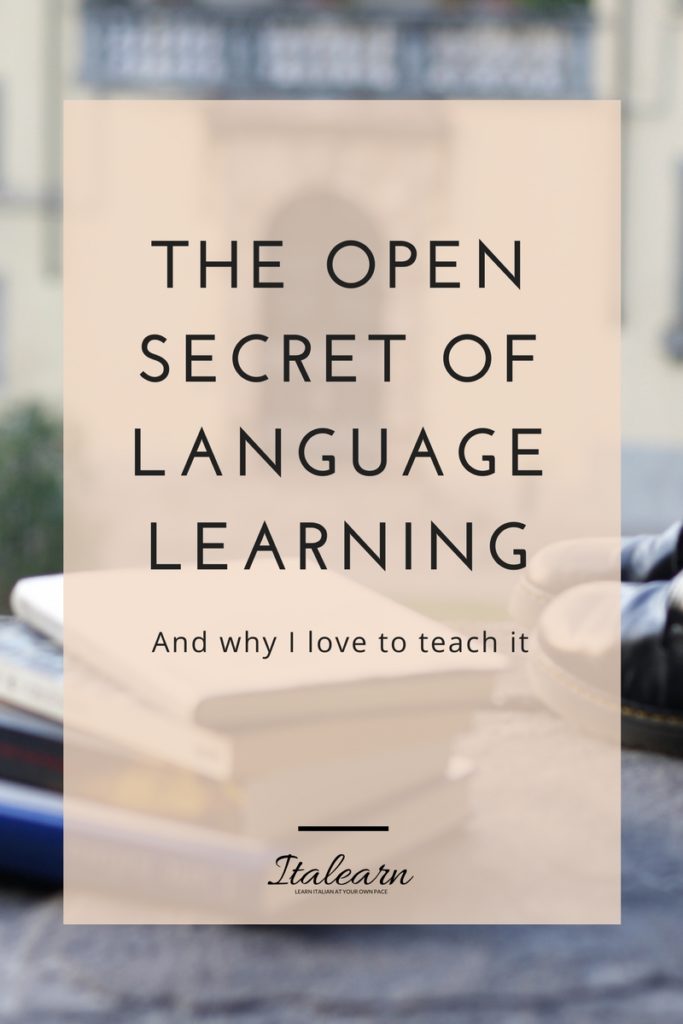There are uncountable different methods, approaches, techniques when it comes to language learning. It seems all teachers have their proven method to bring you to the next level, or to skyrocket your fluency in one month, or to teach you basic Italian in just three days.
I don’t believe in next levels, fluency boosters, and lightning speed learning.
For me, there is one real thing you can do as a language learner: speak that language. And read, and listen, and make friends. Languages are alive, Italian is going through change constantly, it is evolving fast and the only way you have to learn it is to connect with it and with its speakers. Being sociable is not only good for you in a broader sense, it helps you to substantially improve your language skills.
The biggest mistake you could make is not missing a double and saying ani instead of anni when you talk about your age (btw, ani means anuses and anni means years) it is comparing yourself to others, even the native speakers of your target language, and feel frustrated because you are not “as good as them”.
If you are not a polyglot, don’t compare to them
But while being connected with other students, native speakers, language buddies, teachers is desirable, it is of the utmost importance that you don’t compare your own experience to other people’s, especially polyglots.
Perhaps my wording here may sound like it’s a bad thing to be a polyglot, of course it’s not, I even consider myself a polyglot, but I know you are not, and maybe you don’t even care to become one. You only want to learn Italian, for a reason that’s personal to you, and this is probably the first foreign language you learn.
Polyglots, on the other hand, are languages lovers from deep within, they start learning languages from a very young age. Usually, in high school they start experimenting with strategies and sharpening their techniques, so by the end of school they are language learning-savvy.
This means that they have developed a method, they have strategies in place that can be reused for multiple languages, they study the characteristics of the languages they will be learning next and already have a basis for comparison when they actually start to study them.
Foreign languages are an integral part of their life, they are what turn them on, they could never stop talking about languages and they can’t seem to stop to learn new ones.
Are you in this group, or are you more the type of person who wants to enjoy a new thing and hopes she will be able to put together a few words in Italian so she orders the right thing at the restaurant? The second group, right?
Actually, just don’t make comparisons
Ok, now that we have excluded one group from your comparison radar, let’s go on and also rule out, well, anyone else! Even your language partners, friends, fiance, mom, etc. Why you should avoid comparison anyway? I’ll use a couple of examples to make it easier to see the traps of comparison – that will only lead to frustration.
Very often, when you feel frustrated you wish you never started, you just want to stop and do something else. But you started your language learning experience because you wanted to do something meaningful and pleasant for you, so keep this in mind if you are now in that stage of “I can’t take it anymore”.
Let’s suppose you are learning Italian with your partner and you are both beginners, so you start from the same level, the ground floor – of an elegant, tall building with a fancy rooftop bar where you’ll be enjoying the best dinner of your life (ok, maybe one of your best dinners?).
Let’s also suppose that you can only use the stairs to reach the rooftop, and you have to pass through all the floors where you’ll find restaurants, shops, spas, friends. Is there a way for you to predict when, how and if it’s going to be the two of you who arrive on the top roof terrace together?
No, because you are two different people and getting on top together, at the very same time, after an x amount of “hours” is not likely to happen (who stopped for a coffee?), unless one of you leads and the other follows. But this is not fair toward yourself, either to lead or to follow.
This is not an honest approach and it will not bring any result. You have to “feel” your own pace and progress according to your most natural way. Listen to yourself, it will spare you a good deal of disheartenment and disappointment.
Piece of advice #2: avoid competition
Your partner and you can have common goals, like reaching the terrace together, but you won’t be able to make all the way up there going at the same pace – unless one of you decides to adapt to the other’s pace.
What’s even worse is the competition that could spark among the two of you, “who’s going to be sitting in the terrace café, glass of ruby red wine in their hand, waiting for the other to finally arrive – second?”.
Competition is one of the enemies of any learning experience, so please promise me you are not going to engage in a race with another person, ok?
Piece of advice #3: say no to frustration
A second enemy of any learning experience, especially language, is frustration. Imagine you start studying Italian with your best friend and she is so good at it that you almost spill your coffee when you hear her speaking?
It can happen that one of the two is a faster learner, or maybe is just putting more effort in learning the language and gets the best results in a shorter amount of time. If this person is not you, it can be frustrating to accept it.
You feel a sense of failure, but this failure is only associated to some fake expectations that you had for the whole experience of learning with another person.
Because you have connected the two of you, you have not taken into consideration the possibility of being the one who is slower or the possibility of having a different learning style.
So you may think you have failed, but this is simply not true. The only mistake you have made, if we can call it a mistake, was not to give enough importance to yourself and how you learn. Listen to yourself!
It’s ok to share your learning experience with a significative other, but make an agreement before starting:
I hereby commit to do things at my own pace, to support you, and to be soft with myself. We’re in this together and we’re going to love everything of it!
Start with the right foot and make it personal.
Enjoy the ride, it’s yours
People always say we don’t have to take things personally, but I say you should this time. Only remember that this is an occasion to pamper yourself, not to be judgemental.
Focus on you, on how fast or slow you like to learn, on how many repetitions you need before you can pronounce a word correctly, on how many examples you need before you can say that you really understand a grammar rule, on how many hours a week you need to dedicate to conversation, etc.
If you answer these questions and check what your friend has answered to the same questions, you’ll see that they are different.
So, make it personal and focus on you. Be honest with yourself, don’t push too hard. Language learning is one slow ride, take some time to look out of the window, smell the fresh air, and smile.


Get better at Italian through creative exercises. Sign up for the free mini-course A story and 5 creative ways to fall in love with Italian and I'll send you the story straight away.
PS: no artistic skills required!
Thank you!
Check your inbox! You have just received an email from me so you can confirm that you really, really want to receive the free guide and updates from me.
Silvia




